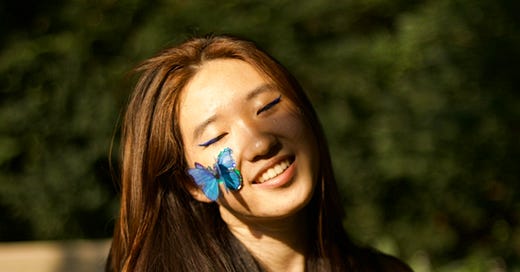Who would have thought...?- JULY UPDATE
🧠 How do I think better?
Great thinkers like Leonardo Da Vinci, Jane Goodall, Neil Degrasse Tyson think for themselves.
For example, when Malcolm Gladwell reads books, he flips to the end to read the sources of the author mentioned. Then, he thinks about what conclusion he would have come to reading those sources, compared to the author. This desire to seek the objective truth is a superpower.
I often remind myself that these successful people are just like any average person and circumstances, some even worse… yet their thinking pushed them ahead. With this in mind, I know I can take responsibility and train myself to be a great thinker.
Instead of living in a passive state of trying to “find passion” or “find myself”… I should focus on “building passion” and “creating myself.”
🦋 Throughout this summer I have been intentional about exploring my interests deeper. This is my July update…
The Krebs Institute launched its first event this month!
I started a community organization this month called the Krebs Institute inspired by the theory of the Krebs Cycle of Creativity that proposes that science, art, design, engineering cycle through each other to brew innovation. We need to pursue interdisciplinary thinking to innovate, rather than being stuck in one field.
This mission stuck to me and I decided to pursue it. This is the story…
I originally started a club (~20 members) early this year with my friend Adara Hagman to host bi-weekly design sprints where we creatively solve prompts like:
“How would you design a 100-floor elevator” What would the button keyboard look like? How would you help the users spend the long wait of 100 floors?
“How would you redesign masks for comfort, cost, and environmental sustainability?” Which many creative designs came out of this one— such as adding a self-cleaning coating to the front of the mask to prevent bacteria build up.
👀 Seeing interest in design sprints, I decided to pursue this vision—
I launched a small event of 8 people this month to explore the intersection of science and art!
We read a scientific research paper and turned it into artwork!
Check out the quick 1 minute video below on what our event looked like.
Now in August, we’re launching an event in Vancouver on August 6th, and one in Toronto on August 7th.
I would love it if you can attend or share this event with a friend!
Also, if you’d like… give us a follow on Instagram for educational content on science and art + upcoming events:
My team and I won the Benchsci and TKS hackathon!
Benchsci is one of Canada's fastest-growing startups with the world's most advanced biomedical AI to run better experiments. They partnered with the Knowledge Society to run a hackathon from a selected 18 global teams to compete.
I’m so grateful to have worked with Benchsci and my team to place first in this challenge (As you can see from my excited face in this screenshot)! We won an internship, customized hoodies, and a pool of 5K between our team- wow so grateful! <3 I look forward to implementing this solution.
More on our solution if you’re interested:
Under a 3 week challenge, my team and I focused on improving clinical oncology trials due to their high failure rate of 98%.
Specifically, the problem is that every year, drugs are approved to treat deadly diseases. However, oftentimes, researchers don't even fully understand how their own drugs work.
This is the case for more than half of all drugs approved by the FDA, because properly understanding how a drug works isn't actually a regulatory requirement. Companies only need to prove that a drug is safe and that it works, not why it works.
This is one of the biggest root causes of clinical trial failures—pharmaceutical institutions don't spend enough time and money on validating a drug's target and understanding its mechanism of action, due to time and resource constraints. Meanwhile, off-target interactions of drugs are not studied enough in the early stages of clinical trials, which leads to many consequences in the later stages.
Our team developed a solution to provide easy access to information on drug targets, with the goal of better understand a drug’s mechanism of action. This would allow for companies to save money by detecting early on that a drug doesn’t work, or even through repurposing a failed drug.
As with the luxury of the vaccine, got to meet up with some friends!
Some friends and I host weekly calls where we check in on each other’s growth, called Squad Syncs. I’ve found it incredibly helpful to feel a sense of community and after all just serendipitous conversations about life. Having these weekly syncs inspire me throughout the week, and incredibly grateful for my friends.
Three interesting resources that inspired me this month
That’s it for the month of July!
I would love to hear your thoughts or feedback on how to improve these newsletters.
Until next time,
Christina






